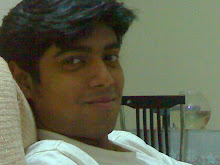It's the same in Delhi
I was wrong. I had thought that of all the metros only Mumbai had the dubious distinction of being anti-Muslim. Zia's brilliant article in HT Delhi was an eye-opener. Here's the piece.
‘We are not the Other’
Pushed into ghettos, branded, alienated, Muslims in the capital beg ‘target terrorism, not community’ as intelligence agencies come knocking
ZIA Haq.New Delhi
Nobody is happy in Batla House Chowk, an unauthorised locality deep inside south Delhi. Not the bearded fruit-sellers in its car-wide lanes. Not the recalcitrant youths huddled outside the government school, hemmed in by a flea market. Not even the cloth merchant, whose business has been rather good all this month. The vast Muslim ghetto in Okhla is actually simmering. And it mirrors others like Seelampur and even Minto Road in the heart of the Capital. Locals feel the search for leads to repeated terrorist attacks, like the Mumbai blasts, has landed the police and intelligence authorities at the doorsteps of innocent Muslims. And they could be the next to face the needle. "How could they say in five minutes it was SIMI, when it took them five days to confirm that RDX was used?" asks Fariq Anjum, a fabric-seller. There is fear even outside the ghettos. Sheikh Manzoor, the head of UNI's Urdu service fears for his son Adnan's life in Mumbai. A second-year engineering student of S.S. Engineering College, Adnan, has been held back by his parents even though his holidays are over. A suspended disbelief has taken over: intelligence agencies are targeting "Muslims, not terrorists". "In office, I feel guilty of being a Muslim. So I keep quiet. I feel as if I was one of the bombers," says 30-year-old Moonis Rehman, an English-speaking business executive with the Vasant Kunj-based tradeindia.com. Some pockets border on vengeance, as if they were a pressure-cooker of pent-up feelings without a safety valve. The detention of 11 tablighis (Muslim preachers) from Thane in Tripura on suspicion of being involved in the back-to-back train blasts has hurt them most. Everybody here is angry, especially people with Ansari for a surname. "Aisa lagta hai kal mujhe bhi terrorist karar denge, kyunki main bhi ek Ansari hoon aur main bhi Kashmir se taluq rakhta hoon (I fear tomorrow I may be branded a terrorist because my surname too is Ansari and I have my roots in Kashmir)," says 32-year-old Ibrahim, whose paan shop is much-sought after. A snaking lane leads to the large house of Rahaat Mahmood Choudhury, a venerable face of the locality and a senior functionary of the UP-UDF. "Target terrorists, not a community is all we say. Did you have to suspect a group of Muslim preachers only to give them a clean chit? We were distrustful of politicians. Now, even intelligence officials cannot be trusted," Rahaat says. In Seelampur, as dusk falls, mothers get worried over sons staying out late, especially those who venture out of the area. "It's better if they return home early. Situation is bad," says Dilshad Bano, a mother of three who has never read a newspaper. And why is the situation bad? "These are the days of bomb blasts, that's why," she says. Shackled by ghettos Majority of Delhi's Muslim population (2001 Census puts it at 6,23,520) lives in such community sprawls, the biggest being the Walled City. There are five Muslim legislators: Pervej Hashmi (Okhla), Choudhury Matin Ahmed (Seelampur), Tajdar Babar (Minto Road), Shoab Iqbal (Matia Mahal) and transport minister Haroon Yusuf (Ballimaran). All represent ghettos or parts thereof. Ghettos don't just give Muslims a living space. These give them security and a sense of belonging. But living in such surroundings may not be a natural choice. Jamia University professor Rizwan Kaiser had just finished his studies in JNU in 1991, when he started to hunt for a house in the Munirka area. He never found one. Hindu landlords gave peculiar excuses. "So ghettos are often a matter of compulsion not choice. People move in for reasons of culture, security and convenience." According to the Economic Survey of Delhi of 2001, 2.6 million people lived in slums, and only 1.7 million and 3.3 million lived in regularised and planned colonies, respectively. Living in a ghetto is not a pleasant experience for many. For one, the density of population is high. Civic amenities are even poorer there. And you can find a university teacher, a well-to-do businessman and a butcher living uncomfortably as neighbours. "As a result, social negotiations suffer," Kaiser says. And worst, during riots, a Muslim will be left to fend for himself in a ghetto, Kaiser adds. "That's what happened to Irfan Jafri during the Gujarat riots". Kaiser doesn't have a problem if police arrest SIMI activists or LeT militants for the blasts. "I don't really care, as long as they don't use the word Muslims. Terrorists have no religion." Most people especially outside the slums don't look at organisations like SIMI with any sense of approval. They will "die for secularism". But Urdu journalist Anees Jamee feels the responsibility of being secular lies on the majority. "Secularism majority ki zimmedari hai, minority ki majboori (Secularism is the responsibility of the majority)". He sums it up in a brilliant irony: The lot of a Hindu in Delhi's Muslim-dominated Batla House Chowk and a Muslim in Hindu-majority Rohini is same. Both are in the minority, both without a voice.


0 Comments:
Post a Comment
Subscribe to Post Comments [Atom]
<< Home